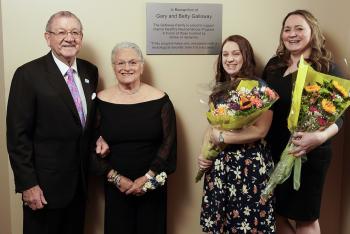Inspira Health proudly recognizes the philanthropy of Gary and Betty Galloway of Vineland, N.J...
Read More
In the United States, someone suffers from a stroke every 40 seconds, and every four minutes there is a stroke-related death. Yet patients who receive emergency medical attention within three hours of symptoms recover better within three months than those who delay care, according to the Centers for Disease Control and Prevention (CDC). Sadly, delayed care often stems from not knowing the symptoms. So here’s a stroke crash course.
“Strokes are caused by blood clots or broken blood vessels that block blood and oxygen flow to the brain. This suffocates the afflicted area, kills those brain cells and ultimately causes the characteristic disabilities like speech problems, loss of motor function and bodily paralysis,” said Susan Lotkowski, D.O., member provider of Cooper and Inspira Neuroscience.
“While the warning signs for all three stroke forms are similar, each form of stroke will require a different treatment or rehabilitation plan, especially if it’s not treated right away. That is why knowing the symptoms is critical to a speedy recovery,” said Dr. Lotkowski.
“With strokes, every second matters—seeking immediate medical help is often the difference between life or death, not to mention it helps to prevent long-term disability,” said Dr. Lotkowski. “These symptoms appear quickly, so if you feel numb in your face, arm or leg, feel confused, have difficulty speaking, can’t see well, are dizzy or have a severe headache, call 9-1-1 immediately.”
The CDC recommends the “F.A.S.T.” approach, which stands for: face, arms, speech and time. “If you are concerned that someone is having a stroke, you need to ask: Does their face droop? If they lift both arms, does one fall down? Is their speech slurred? If the answer is yes to any of these questions, then time is of the essence. Call 9-1-1,” said Dr. Lotkowski.
In the U.S., strokes are not only the fifth leading cause of death, but also the leading cause of long-term disability, according to the CDC. Although strokes can happen to anyone, at any age, there are several ways to lower your risk.
“High blood pressure is the top risk factor for having a stroke. In 60 million Americans who have high blood pressure, nearly 33 percent don’t know it. So check your blood pressure just once a year, or more frequently depending on your medical history,” said Dr. Lotkowski. “Additionally, lowering your cholesterol, maintaining a healthy weight, eating a healthy diet and increasing your physical activity are great ways to reduce your risk of stroke.”
The risk of stroke increases with age, but that doesn’t mean it can’t happen to you now. “The best thing that we can do is control what we can control. And that means being honest with your health care team, sticking to your care plan and above all, taking good care of yourself,” said Dr. Lotkowski.
If you or someone you know is suffering from a stroke, dial 9-1-1 immediately.
Cooper and Inspira Neuroscience aims to improve local access to a comprehensive range of advanced neuroscience care, including surgical and nonsurgical services related to the brain, spinal cord and central nervous system.

Inspira Health proudly recognizes the philanthropy of Gary and Betty Galloway of Vineland, N.J...
Read More
Cooper University Health Care and Inspira Health today announced the formation of Cooper and Inspira...
Read More
Traffic accidents are at an all-time high in New Jersey, with fatalities increasing by almost 14...
Read More
The material set forth in this site in no way seeks to diagnose or treat illness or to serve as a substitute for professional medical care. Please speak with your health care provider if you have a health concern or if you are considering adopting any exercise program or dietary guidelines. For permission to reprint any portion of this website or to be removed from a notification list, please contact us at (856) 537-6772